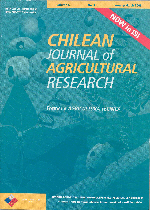
|
Agricultura Técnica
Instituto de Investigaciones Agropecuarias, INIA
ISSN: 0365-2807
EISSN: 0365-2807
Vol. 63, No. 4, 2003, pp. 394-402
|
 Bioline Code: at03045
Bioline Code: at03045
Full paper language: Spanish
Document type: Research Article
Document available free of charge
|
|
|
Agricultura Técnica, Vol. 63, No. 4, 2003, pp. 394-402
| es |
Efecto de Cuatro Láminas de Agua Sobre el Rendimiento y Calidad de Tomates de Invernadero Producido en Primavera-Verano
Ortega-Farias, Samuel; Leyton, Ben-Hur; Valdés, Hector & Paillán, Hernán
Resumen
Se realizó una investigación para evaluar el efecto de cuatro láminas de agua sobre el rendimiento y calidad de un cultivo de tomates ( Lycopersicon esculentum Mill.) cv. Presto, producido en invernadero en la Estación Experimental Panguilemo de la Universidad de Talca (35 ° 23' lat. Sur; 71 ° 40' long. Oeste; 110 m.s.n.m), durante los meses de agosto de 2000 a enero de 2001. Los tratamientos de riego correspondieron a una reposición de 60 (T1), 100 (T2) y 140% (T3) de la evapotranspiración real (ETreal) y un testigo (T4) que correspondió a las láminas de agua que los agricultores utilizan tradicionalmente en la zona. Los resultados indicaron que el mayor rendimiento total (180 t ha-1) fue obtenido en el tratamiento T3, seguido por el testigo. Los mayores rendimientos comerciales fueron observados en los tratamientos T3 y T4, los cuales correspondieron a 129,8 y 120,3 t ha-1 , respectivamente. El diámetro y peso de los frutos fueron reducidos a medida que se aplicaron cantidades de agua menores; por el contrario, los sólidos solubles y el peso seco fueron aumentados. El tratamiento T3 presento la mejor combinación de rendimiento y calidad para el cultivo de tomate producido en invernadero, con una reducción de un 72 % en la aplicación de agua en comparación al tratamiento T4.
Palabras-clave
riego, Lycopersicon esculentum, sólidos solubles, materia seca, rendimiento.
|
| |
| en |
Effect of Four Levels of Water Application on Yield and Quality of Greenhouse Tomatoes Produced in Spring-Summer
Ortega-Farias, Samuel; Leyton, Ben-Hur; Valdés, Hector & Paillán, Hernán
Abstract
A study was carried out to evaluate the effect of four levels of water application on the yield and quality of a tomato ( Lycopersicon esculentum Mill.) cv. Presto produced in a greenhouse at the Panguilemo Experimental Station, of the University of Talca (35°23'S lat; 71° W long; 110 m.a.s.l.), during the period August 2000 and January 2001. The irrigation treatments were application of 60 (T1), 100 (T2) and 140% (T3) of the actual evapotranspiration (ETreal) and a control (T4) was the irrigation level that farmers traditionally apply in the region. The results indicated that the largest total yield (180 t ha-1) was obtained by treatment T3, followed by treatment T4. The largest commercial yields were observed in treatments T3 and T4, which corresponded to 129.8 and 120.3 t ha-1 , respectively. The diameter and weight of fruit were reduced as the water application decreased, but soluble solids and dry matter increased. The treatment T3 was the best combination of yield and quality of greenhouse tomatoes with a 72% reduction of water application in comparison with T4.
Keywords
irrigation, Lycopersicon esculentum ., soluble solids, dry matter, yield.
|
| |
© Copyright 2003 - Instituto de Investigaciones Agropecuarias, INIA (Chile). Free, full-text also available from http://www.inia.cl/at/agritec.htm
Alternative site location: http://www.inia.cl/at/agritec.htm
|
|
